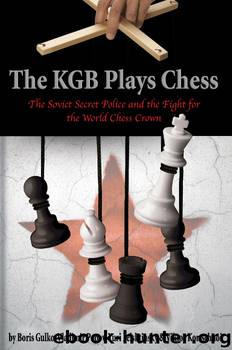The KGB Plays Chess by Yuri Felshtinsky & Vladimir Popov & Yuri Felshtinsky & Viktor Kortschnoi

Author:Yuri Felshtinsky & Vladimir Popov & Yuri Felshtinsky & Viktor Kortschnoi [Gulko, Boris]
Language: eng
Format: epub
ISBN: 978-1-888690-75-0
Publisher: SCB Distributors
Published: 2011-05-24T16:00:00+00:00
3. Our Game Against the KGB: The Opening
Today, it’s hard for me to say which of us first realized that it was time for us to leave. I’m older than Anya by ten years and, of course, had more life experience. But I remember how Anya once said to me: “You’ve often said that one shouldn’t live in the USSR. So when are we going to file papers to emigrate?” It’s one thing to understand something, it’s another thing to say: “The moment has come.”
When I returned from the Olympiad, we ordered an invitation from nonexistent relatives in Israel – a necessary procedure at the time. The invitation arrived on May 1, and on May 15, 1979, on the anniversary of Israel’s declaration of independence, we brought our papers to the Visa Registration Office (OVIR) of Moscow’s Zhdanovsky district and filed a request for permission to emigrate to Israel. A remarkable period of our life began, seven years of struggle to leave the Soviet Union.
A request to emigrate by two recent champions of the USSR was big news in the world of Soviet chess. Anya had first participated in the USSR Women’s Chess Championship in 1976. And despite the fact that the tournament’s other participants included the women’s world champion, Nona Gaprindashvili, and Maia Chiburdanidze, who would take over this high title in 1978, as well as all of the other top female chess players in the world, Anya won the championship. Former world champion Mikhail Botvinnik, who played before the public several times in those days, repeated time and again that, while the men’s world champion title was firmly in Soviet hands with Anatoly Karpov and Garry Kasparov, the women’s crown could leave the USSR along with Anya Akhsharumova. Botvinnik had been Anya’s mentor in chess and prized her talent highly. For some reason, he always began his list of his best students not with Karpov and Kasparov, but – even during our years as refuseniks – with her.
My name was often mentioned in conjunction with that of Kortschnoi. It was said that if I emigrated, I would help Kortschnoi to win the world championship title from Karpov. This alleged potential collaboration between us was confirmed by Kortschnoi himself. In one of his interviews, which I heard about on some foreign radio station, Viktor declared that his coach Boris Gulko was being denied permission to leave the USSR to join him. And although I had not talked to anyone about collaborating with Kortschnoi, such a remark was surely noticed both by the Sports Committee and Karpov.
Anatoly Karpov in those days was extraordinarily influential. He was a unique phenomenon in Soviet life, a genuinely exceptional figure in terms of his creativity and at the same time faithful to the Communist Party and the KGB nomenklatura.
Good writers were opposed to the government by definition. Only hacks like Safronov or Kochetov were loyal. To be sure, there was also the Nobel laureate Mikhail Sholokhov, who had spent the last few decades of his life drunk.
Download
The KGB Plays Chess by Yuri Felshtinsky & Vladimir Popov & Yuri Felshtinsky & Viktor Kortschnoi.epub
This site does not store any files on its server. We only index and link to content provided by other sites. Please contact the content providers to delete copyright contents if any and email us, we'll remove relevant links or contents immediately.
The Vikings: Conquering England, France, and Ireland by Wernick Robert(83714)
Ali Pasha, Lion of Ioannina by Eugenia Russell & Eugenia Russell(40245)
The Conquerors (The Winning of America Series Book 3) by Eckert Allan W(37389)
The Vikings: Discoverers of a New World by Wernick Robert(36974)
Cecilia; Or, Memoirs of an Heiress — Volume 1 by Fanny Burney(32548)
Cecilia; Or, Memoirs of an Heiress — Volume 2 by Fanny Burney(31947)
Cecilia; Or, Memoirs of an Heiress — Volume 3 by Fanny Burney(31932)
Empire of the Sikhs by Patwant Singh(23074)
The Secret History by Donna Tartt(19058)
Hans Sturm: A Soldier's Odyssey on the Eastern Front by Gordon Williamson(18575)
Cat's cradle by Kurt Vonnegut(15339)
Pimp by Iceberg Slim(14488)
Sapiens: A Brief History of Humankind by Yuval Noah Harari(14370)
Talking to Strangers by Malcolm Gladwell(13350)
Norse Mythology by Gaiman Neil(13349)
Leonardo da Vinci by Walter Isaacson(13318)
4 3 2 1: A Novel by Paul Auster(12377)
Underground: A Human History of the Worlds Beneath Our Feet by Will Hunt(12090)
The Radium Girls by Kate Moore(12018)
